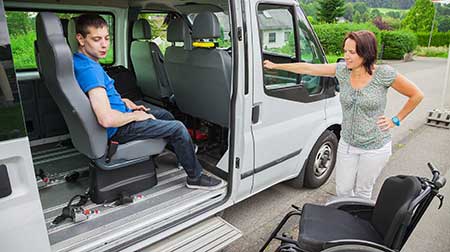Inspectors gave the council and health chiefs a good rating for their partnership work with some of the most vulnerable children in Brighton and Hove.
But their report found a need to do several things better and identified three broad areas for improvement in catering for children and young people with special educational needs and disabilities (SEND).
The findings were published after a joint inspection by a team of seven from Ofsted and the Care Quality Commission (CQC) in late March.
The report said: “The partnership approach to helping children and young people prepare for adulthood is underdeveloped.
“Early identification of young people who are at risk of not being in education, employment or training is not well co-ordinated.
“Information, advice and guidance about future careers and independence are not considered early enough.
“In addition, there is not enough strategic planning involvement from health and social care. For example, there is a gap in provision for young people who need a clinical speech and language therapy service that is not linked to an education need.
“Similarly, there are not enough personal assistants to support young people to be independent.
“Leaders have not monitored the quality of EHC (education, health and care) plans well enough. Some plans are written in a generalised way and do not adequately reflect the individual at the heart of the plan, particularly when considering the support they need to succeed.
“Social care and health needs are less well represented than education. An exception to this is where children are placed in a specialist provision.
“A small minority of children and young people who require alternative provision do not receive education placements that are well enough tailored to their special educational needs (SEN).
“The local authority has consulted with schools to increase the supply of appropriate alternative provision and specialist school places.
“A new post to co-ordinate the commissioning and to check the quality of alternative provision has been agreed. However, the pace of change is not yet fast enough.
“Some children and young people wait too long to find a specialist school place. While they wait, some are placed in alternative provision or on part-time timetables.
“Families who responded to Ofsted’s survey told us about how this can have a negative impact on children and young people’s learning and wellbeing.
“The local authority has secure plans to increase the number of specialist school places from September 2023.
“The role of the designated medical officer/designated clinical officer for SEND is under-resourced. Frequent changes in commissioner mean that the role has not been developed as needed in order to be able to support the partnership.
“It has also taken some time for partnership leaders to fully understand the impact of some commissioning arrangements.
“This means that some health planning and practice for children and young people with SEND have not improved in a timely enough manner and some families experience drift and delay in getting access to the services they need.
…
“The partnership’s approach to monitoring the impact of the SEND strategy is in its infancy. In addition, leaders have not communicated effectively or regularly enough with children, families and wider partners about the improvements they are making and the impact of their work.
“The lack of clarity about the pace of change across the partnership leads to unnecessary worry for families, children and young people.”
The report set out three areas for improvement
Leaders should improve their strategic approach to preparation for adulthood so that all young people receive the right help and support they need to lead successful lives.
Leaders must continue to develop their oversight and commissioning arrangements of suitable alternative provision so that there is sufficient provision that meets children and young people’s SEN.
Leaders across the partnership should identify the steps that they will take to collectively monitor and measure the impact of their strategy and actions. These plans should be made clear to children, young people and their families with SEND in Brighton and Hove.
…
The report said: “Co-production (a way of working where children, families and those that provide the services work together to create a decision or a service that works for them all) is a strength across Brighton and Hove. It is embedded in the local culture and is based on a relationship of trust and respect.
“The voices of parents, carers, children and young people influence strategic development and the commissioning of services. Parent voice is well represented in various panels across the city when considering access to services for individual families.”
Good examples of co-production included the changes of home to school transport after a disastrous procurement exercise four years ago, with particular praise for the Parent Carers’ Council (PaCC).
The report also said: “The local area partnership’s arrangements typically lead to positive experiences and outcomes for children and young people with special educational needs and/or disabilities (SEND).
“The local area partnership is taking action where improvements are needed. The next full area SEND inspection will be within approximately five years.
“Brighton and Hove City Council and NHS Sussex Integrated Care Board are jointly responsible for the planning and commissioning of services for children and young people with SEND in Brighton and Hove. Communication between partner agencies is strong.
“This includes with the Parent Carers’ Council, known as PaCC, and voluntary organisations such as Amaze, which hosts the local SEND information, advice and support service (SENDIASS).
…
“Children and young people are at the heart of Brighton and Hove’s strategy for SEND.
“Most children and young people’s needs are identified accurately and assessed in a timely and effective way right from the start.
“Health visitors and school nurses work effectively in order to identify and respond to emerging needs in babies, children and young people.
“And although there are long waits for neuro-developmental assessments and access to child adolescent and mental health services, children and young people can access bespoke help while waiting for a diagnosis.
“Children and young people, their families and schools especially value the help and support provided by Brighton and Hove Inclusion Support Service (BHISS).
“For example, the school’s wellbeing service gives advice to parents, carers and schools about how to meet the mental health needs of children and young people.
“Children and young people typically get the right help at the right time.
…
“In schools, staff are increasingly well trained to understand the different needs of children and young people with SEND.
“This is helping to significantly reduce incidents of suspension and is improving the attendance of children and young people.
“However, a lack of appropriate alternative provision in Brighton and Hove means that some children and young people are not able to get the right help quickly enough.
“Children and young people are supported to share their voices and opinions. Their voices are particularly well reflected across all education, health and care (EHC) plans.
“Organisations such as Amaze connect with children and young people well. Children and young people who are part of neuro-developmental assessments have a child-focused conversation to inform planning.
“Because they are part of the process and are listened to, children and young people are able to participate and be heard, and typically feel included in the Brighton and Hove community.
…
“Children and young people are well supported as they move between schools. Transition between the early years and primary school is especially thorough.
“However, transitions from child to adult health services are not currently smooth enough for some young people.
“As they get older and leave school, young people would like more opportunities to engage in accessible activities.
“Furthermore, a lack of sufficient short-break placements and personal assistants means that some children and young people and their families have limited access to these activities.”
…
Amaze said: “Heartfelt thanks go to PaCC staff and reps for working so hard to represent parent carers as best they could, within the constraints of the new inspection framework.
“Overall, it was frustrating that opportunities for parent carers to input directly to the process were reduced, limited mainly to the online survey which ran for just six days, and that there was little chance for ‘a right to reply’ from PaCC on the issues which came up during the inspection.
“We unfortunately don’t know what the 1,000 responses to the survey said but we do know that was a strong response rate and we’re grateful to everyone who took time to share their story.
“Most importantly, the report doesn’t change what we already knew, that not all families are accessing the support that they need and that gaps in provision persist.
“We know that not all families are experiencing the typically positive outcomes reflected in the report.
“We are 100 per cent focused on the areas for development highlighted by the inspection – these are some of the priorities which PaCC and Amaze have been raising with partners for some time.”

The council’s executive director for families, children and learning, Deb Austin, said: “We welcome this inspection report as it both highlights the good work the partnership is doing but also shows where we must improve so there’s no room for complacency.
“What has been invaluable is the involvement of PaCC and Amaze. We continue to welcome the challenge they provide to the partnership to further improve support and services for children with SEND and their families.”
NHS Sussex chief medical officer Dinesh Sinha said: “We are committed to ensuring that all young people receive the right help and support they need to lead successful lives, and welcome the report’s findings.”
Dr Sinha added: “We recognise that there are challenges in relation to waiting times for some health services, and we are working with stakeholders to improve our support offers.
“We will continue to work with all our partners, including children, young people and their families, to further develop arrangements to ensure that health services meet children and young people’s special educational needs now and in the future.”










A national failure not just in B&H. Had Ofsted taken into account the report provided by mASCot showing the failings detailing many, many cases where they have not supported the education or care of young people and children this report would have looked even worse. Shame on them.
Funnily enough that’s not my kid’s experience-all the problems mentioned were/are there in spades, however the areas claimed as good weren’t. There was no support from BHISS as the LA had tried to farm them out to a relatively cheap private place, and this seemed to disqualify them from all external support except what the school hired in, which didn’t work. Occupational therapy and Speech and Language didn’t engage at any point in their education and they will likely get no help at all before or during adulthood, currently NEET but listed as Elective Home Educated in the council records, very handy for the statistics.